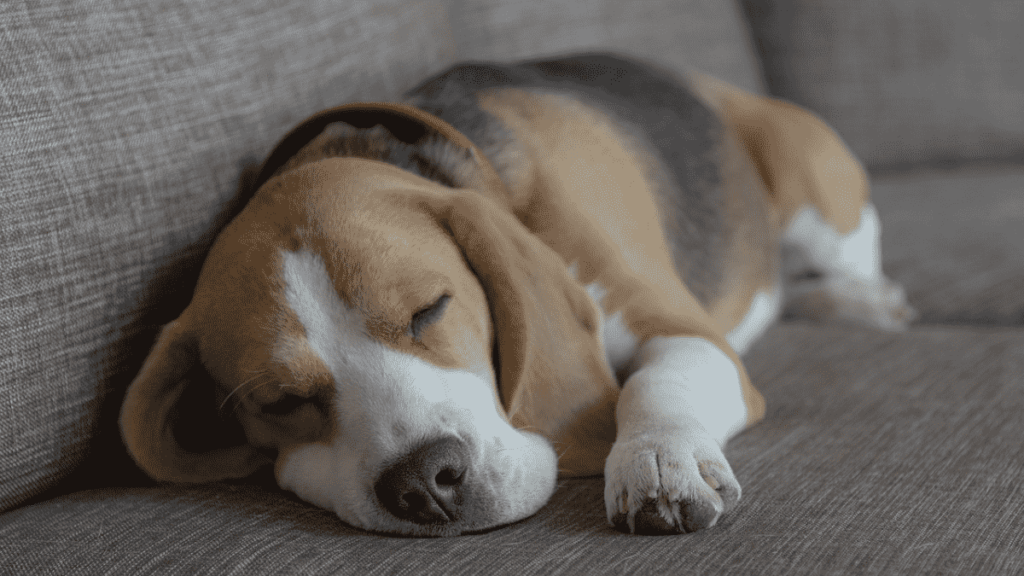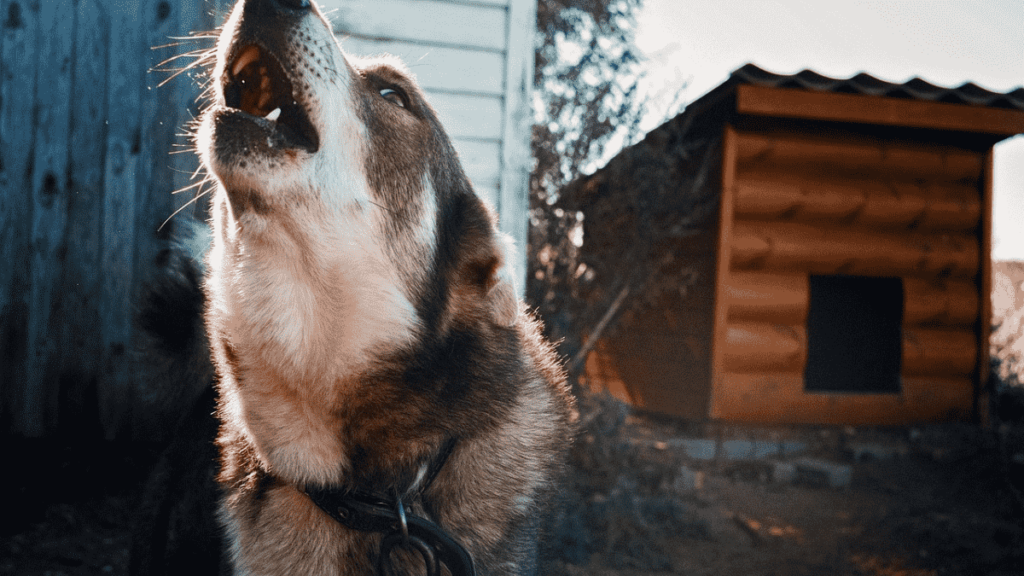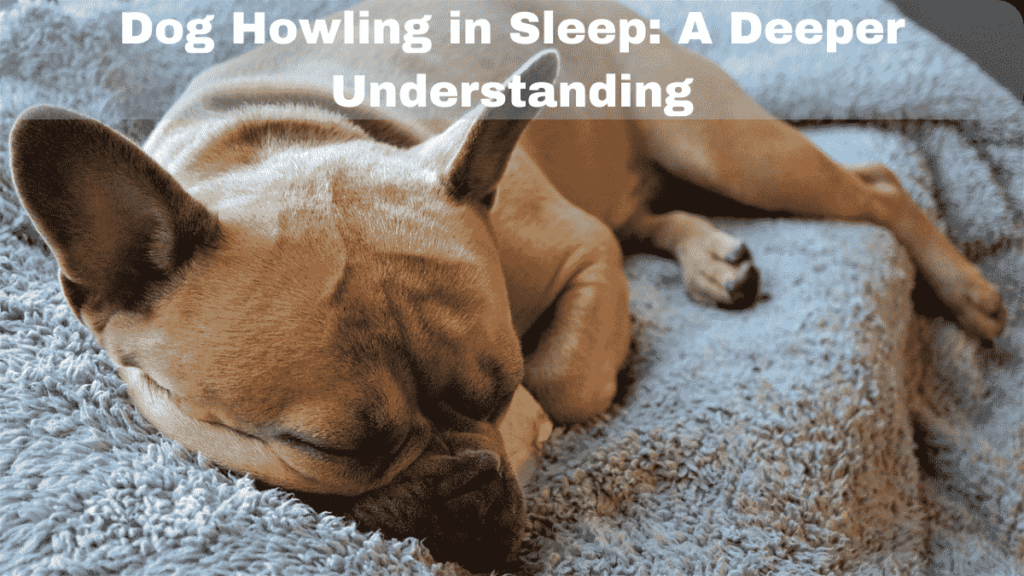There are many vocalizations that dogs can use, including howling. Have you ever heard your furry friend howling while sound asleep? Canines howl to communicate, express emotions, and respond to sounds. It is an innate vocalization. Similar to humans making noises while sleeping, sleep howling is considered normal and may be linked to their dream state. It is possible to help your dog sleep howl by ruling out medical issues, creating a comfortable sleeping environment, and providing adequate exercise and mental stimulation. This article explores the science, psychology, and anecdotes behind dog howling in sleep. We will also explore the reasons behind this behavior and what it might mean for your dog’s well-being. To help you get a good night’s sleep, we’ll also offer tips on how to deal with your dog’s sleep howling.
Understanding Dog Howling
An understanding of canine howling is a fascinating journey into the world of dog behavior and communication. From wonder and contemplation to irritation and annoyance, dogs howl for various reasons. Although not all dogs howl, it is a deeply rooted behavior in canine evolution. Following are some of the reasons behind canine howling:
1. Mode of Communication
Dogs, descended from wolves, retain this behavior as a means of communication between dogs, especially when they live apart. Besides indicating the presence of a dog, howling can also be an invitation to interact, an expression of emotion, or an expression of need.
2. Expressing Emotions
Dogs’ howls can convey emotions such as loneliness, anxiety, or excitement. In order to ensure a harmonious relationship between humans and their canine companions, pet parents should understand the reasons behind their dog’s howling. They may also howl to alert their owners to potential danger.
3. Responding to Sounds
There are certain sounds that can cause dogs to howl, such as sirens, music, and howling from other dogs.
Why Do Dogs Howl in Their Sleep
Dogs, like humans, go through distinct stages of sleep, including REM (Rapid Eye Movement) sleep. The activity of dogs is similar to that of humans when they are dreaming during REM sleep. The EEG scans show close to the same level of activity in their brains as when they are awake; however, their muscles are partially paralyzed to prevent them from physically acting out the dreams. Their sleep behaviors may, therefore, include twitching, leg paddling, and barking and growling sounds similar to human speech. Dogs may dream, but we cannot prove definitively that they do. They often recreate scenes from their experiences, such as chasing a ball and having exciting adventures.
Recommended: Bubble Theory Dog Training: A Complete Guide
In addition to dreaming, dogs may also have nightmares, possibly caused by stress or anxiety. Stressors like anxiety, fear, and environmental changes can disrupt a dog’s sleep, resulting in crying, whimpering, or howling. It is possible to minimize emotional stress and enhance sleep quality by creating a calm, secure environment, exercising regularly, and stimulating the mind.
Factors affecting Dog howling in Sleep
Many factors may contribute to a dog howling in sleep, including the following:
1. Dreams
Dreaming can cause dogs to howl in their sleep. In the REM stage of sleep, dogs may experience intense dreams, leading to howling, barking, or growling.
2. Emotional Distress
In dogs, emotional distress, such as separation anxiety or fear, may cause more intense dreams and vocalizations, including howling.
3. Old Age
As dogs age, their sleep patterns can change, leading to more vocalizations, including howling. For a dog’s comfort and well-being, it is imperative to monitor their behavior.
4. Neurological Disorder
Sleep howling, and seizures can result from neurological disorders such as epilepsy or cognitive dysfunction syndrome.
5. Environmental Triggers
There are factors and ambient sounds in a dog’s environment that also cause them to howl while they sleep. Further, howling could indicate separation anxiety if it is accompanied by pacing, destruction of property, or depression.
6. Physical Discomfort
An underlying medical condition can also cause howling in sleep. It’s important to observe the dog’s behavior and seek veterinary attention if there are any concerns.
What Should I do when My Dog howl in its Sleep

Barking in the sleep of your dog is usually considered to be a normal behavior and is often attributed to dreaming. When your dog howls in sleep, you should consider these tips.
1. Let Them Be
The general recommendation is not to wake your dog up when they bark in their sleep since it can disrupt their sleep cycle and startle them.
2. Understand the Cause
As a result of dreaming, dogs bark while they sleep. According to research on dog brain waves during sleep, dog sleep cycles are similar to human ones, and barking often occurs during the REM (rapid eye movement) phase.
3. Environmental Factors
Consider moving your dog’s bed to another part of the home where they won’t disturb anyone if the noise is becoming a nuisance. Sleep barking should be viewed as just part of your dog’s normal sleep cycle and not a problem.
Recommended: How Male Dog Behave When Female dog is Pregnant
4. Addressing Discomfort
Talk to your vet if your dog’s barking at night interferes with your sleep schedule, and moving their bed didn’t help. You can get advice from your veterinarian on how to deal with your dog’s behavior.
Why Do Dogs Cry in Their Sleep
In general, dogs cry in their sleep for a variety of reasons. A common explanation is that dogs dream about events from the day and communicate subconsciously. During the REM (rapid eye movement) cycle, when dogs are most deeply asleep, this occurs. The occasional whimper or cry during sleep is normal, but excessive crying or unusual crying sounds may indicate an underlying health issue, anxiety, or past trauma. In cases of consistent crying in the sleep of dogs, veterinarians should be consulted.
Are Dogs Light Sleepers?
Due to their evolutionary adaptation, sleep architecture, and sensory perception, dogs are generally considered light sleepers. Sleeping in intervals throughout the day, they spend less time in deep sleep, which allows them to respond to unfamiliar sounds and smells. Dogs are also capable of hearing sounds four times further than humans, making them more alert to noises or disturbances during the night. Additionally, dogs’ evolutionary history as vigilant pack protectors has led them to remain semi-alert even while sleeping. Some breeds and individuals of dogs have different sleep patterns. Still, most dogs have more fitful, fragmented sleep cycles than humans.
Fun Facts about Dog Howling in Sleep

Fun facts about dogs howling in sleep are entertaining because of their endearing and relatable nature. A glimpse into a dog’s inner world can be heartwarming and entertaining, as it offers a glimpse into their dreams and howls while they sleep. In addition to providing a sense of curiosity and merriment, this phenomenon illustrates our furry companions’ universal charm. A heartwarming and amusing video of a dog howling in his sleep often goes viral, resonating with dog owners and lovers. Having the opportunity to share our lives with these loyal and expressive animals not only entertains but also fosters a deeper appreciation for their unique and endearing qualities.
Recommended: Are Australian Shepherds Good with Kids?
How to Stop a Dog from Howling
Several methods can be used to stop a dog from howling, including ignoring it, rewarding quiet behavior, and seeking professional assistance. The following methods can be used to stop dogs from howling.
1. Ignore the Howling
When your dog howls for attention, you should ignore it. It helps to convey to the dog that howling does not yield the desired result.
2. Reward Quite Behavior
You can condition your dog to stop excessive howling by rewarding them when they are quiet. If the dog is quiet, you can reward him with treats or toys.
3. Desensitization and Counterconditioning
Desensitization and counterconditioning techniques can be used to change your dog’s motivation and feelings about a situation. Basically, the dog is exposed to the trigger at a low level and rewarded whenever he behaves calmly.
4. Seek Professional Help
If the howling persists, a Certified Professional Dog Trainer (CPDT) or a veterinarian should be consulted. Their guidance and assistance can help address the underlying causes of howling.
Howling Comparison Between Puppies and Older dogs
The frequency of howling in puppies tends to be higher than in older dogs. The behavior is often attributed to their age and may decrease as they mature. Getting rid of this behavior at an early age is essential for preventing it from continuing into adulthood. As with training an older dog, training a puppy to stop howling requires patience and consistency. A comfortable sleeping environment and sufficient exercise during the day can help reduce howling in sleep. Any underlying health issues should be ruled out by consulting a veterinarian if the howling persists or becomes excessive. In addition, desensitization and counterconditioning can be used to change a puppy’s motivation and feelings, especially if the howling is related to their reaction to a situation.
Final Thoughts
In conclusion, there are several possible reasons for dogs howling in sleep, including dreaming, emotional distress, old age, and environmental factors. Even though howling is generally considered normal behavior, excessive or disruptive howling may warrant a visit to the veterinarian to rule out any underlying health problems. The frequency of howling in sleep can be reduced by providing a comfortable sleeping environment, exercising during the day, and stimulating the mind. We must understand the causes of this behavior in order to ensure the well-being of our pets.

